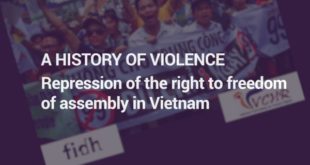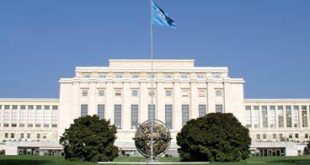Distinguished guests, ladies and gentlemen.
I would like to thank the organizers for inviting me here today to honour the Buddhist leader and the outstanding human rights champion, the Venerable Thich Quang Do. I am proud to be part of an event that brings together so many Vietnamese Buddhists and human rights defenders from all over the US.
I am representing an organization, which is named after a very special man, Mr. Thorolf Rafto. As a professor of economic history at the Norwegian School of Economics (NHH), Rafto brought the whole world into his classroom, and taught that justice and freedom were a part of the curriculum. He devoted his life to the promotion of democracy and respect for human rights, especially in Eastern Europe, where he travelled extensively during the cold war. He was an important spokesman for the persecuted Jews and intellectuals in the former Soviet Union, and for political dissidents in other Eastern European countries. He made Vladimir Tchernavin’s book title “I Speak for the Silent Prisoners of the Soviets,” his life motto.
Professor Rafto died in 1986 only 64 years old. The Rafto Foundation for Human Rights was established to commemorate the late Professor Thorolf Rafto, and to carry on his life-long work to protect human rights. The Professor Thorolf Rafto Memorial Prize for Human Rights has been awarded every year since 1987.
The inspiration of Thorolf Rafto for our work can be summed up by one of Rafto’s remarks, “Birds in cages sing of freedom; birds in freedom fly”. Many Rafto laureates have been like a bird in cage, spending years behind bars or in house arrest. But they have never given up or been silenced. It is our obligation as free citizens of the world to caste light on these courageous individuals and their causes.
I was chairman of the Rafto Foundation when Thich Quang Do was awarded the 20th Professor Thorolf Rafto Memorial Prize in 2006. Sadly, but not surprisingly, Thich Quang Do was not released from house arrest at the Thanh Minh Zen Monastery in Saigon and could not travel to Norway to receive the Rafto award five years ago. For this reason I wanted to go to Vietnam myself to deliver the Rafto diploma to him in person. However, the Vietnamese authorities would not let me enter the country.
In March 2007, the Executive Director of our foundation, Mrs. Therese Jebsen, travelled to Saigon to give Thich Quang Do the Rafto Prize diploma. As soon as she stepped in the courtyard of Thanh Minh Zen Monastery, the Police came and took Mrs. Jebsen away. Thich Quang Do begged them to let her stay and speak with him, even only for a few minutes. But they refused to do so. After long interrogations at a police station Mrs. Jebsen was sent out of the country. This is the way the Communist government of Vietnam receives foreigners who want to pay a special tribute to the venerable Thich Quang Do.
The Hanoi government still keeps him isolated in his monastery, so that he cannot speak out about the lack of freedom and democracy in Vietnam. But Thich Quang Do will not let them silence him. He will continue to speak out for human rights, whatever price he has to pay, like he did in the Ba Sao prison in North Vietnam in 1998. The authorities said they would release him if he would ask forgiveness for his “crimes”. But he refused to do so. He would rather stay in prison than admit to crimes he had not committed. So in the end they released him. As Thich Quang Do puts it: “They could put my body in prison, but not my mind. For me, inside or outside prison is the same. I came from a small prison into a larger one. In Vietnam, the whole population is imprisoned by the regime.”
Two weeks ago the Rafto Foundation celebrated its 25th anniversary. Many Rafto Prize laureates were present in Bergen, Norway, for this anniversary. However, one prominent laureate was absent. Again, Thich Quang Do was not allowed to go to Norway to meet with fellow prize winners and celebrate the common struggle for justice, human dignity and freedom.
Instead Thich Quang Do sent us a very moving greeting over the telephone: “I wish I was a bird. Then I would fly to Norway to join the 25th Ceremony of the Rafto Foundation. That is my great hope. But I could not realize my hopes right now.”
Politically, Vietnam today is like Poland and Czechoslovakia in the late 1970s when the Solidarity and Charter 77 movement came forth. This was at the time when Professor Thorolf Rafto campaigned for dissidents behind the iron curtain.
Like in former Czechoslovakia 35 years ago, most people in Vietnam today are afraid to openly express their views. The Security Police’s repressive mechanisms are everywhere. Only the really courageous people dare to speak out. It is especially hard for the young people and all those who have families to support. If they do anything that attracts the Police’s attention, they are placed under surveillance, threatened, isolated and harassed. Police seek every possible way of stifling their activities.
However there are signs of open protests. This summer Thich Quang Do told us that the Vietnamese people are deeply discontented about the government’s submissive attitude to China. The Vietnamese government has signed Border Treaties with China, giving away your waters and lands. China has claimed the Spratley and Paracel islands. They have invaded your markets with Chinese goods, and sent thousands of workers to mine Bauxite in the Central highlands, destroying the lands and homes of the ethnic peoples.
Out of worry from this development, young people and students staged demonstrations every weekend in Saigon and Hanoi. Thousands of people joined these demonstrations. It was the very first time that people from all different political and religious families were demonstrating together, and it was the first time that the young people of Vietnam took to the streets. Thich Quang Do told us he was very happy to see this.
I am very proud that Vietnam’s most prominent defenders of democracy, religious freedom and human rights, the Venerable Thich Quang Do, is a Rafto Prize laureate. He received the prize for his personal courage and perseverance through three decades of peaceful opposition against the communist regime in Vietnam, and as a symbol for the growing democracy movement in his country.
The Rafto Prize to Thich Quang Do was not very well received by the government in Hanoi, and it caused frictions in the talks between Norway and Vietnam when the Standing Committee on Foreign Affairs of the Norwegian Parliament visited Hanoi five years ago. Vietnam’s government accused Venerable Thich Quang Do for inciting splittist activities. They could not be more wrong.
Thich Quang Do is an intellectual leader and a unifying force in Vietnam. A monk, researcher and author, he has devoted his life to the advancement of justice and the Buddhist tradition of non-violence, tolerance and compassion. Through political petitions Thich Quang Do has challenged the authorities to engage in dialogue on democratic reforms, pluralism, freedom of religion, human rights and national reconciliation. This has provided force and direction to the democracy movement.
However, he has paid a high price for his open voice. The 82 years old Buddhist leader has spent a total of 29 years in detention simply for demanding democracy and human rights for Vietnam. As deputy leader of the banned Unified Buddhist Church of Vietnam, Thich Quang Do is strongly supported by Vietnam’s numerous Buddhists. He also receives broad support from other religious communities as well as from veterans of the Communist Party.
Vietnam is a country where rifts and divisions have always run deep – divisions between North and South, between communists and nationalists, between different religious denominations and political groups, between social classes and generations. Thich Quang Do plays a key role in the work of reconciling dissidents from North and South Vietnam.
Thich Quang Do has always said that democracy can only be realized in Vietnam if people from all these different families join together, bring their diverse talents, skills, knowledge, and enthusiasm, and pool them together into one vibrant movement.
In 2006 when we awarded the 20th Rafto Prize to Thich Quang Do we also recognized the immense hardships faced by Vietnamese pro-democracy activists, who resolutely were fighting peacefully to replace the one-party communist regime with a democratic, pluralist state based on the rule of law and respectful of international rights standards.
Despite Vietnam’s ratification of the International Covenants on Civil and Political Rights, the one-party state is intolerant of criticism. Media, political parties, religious organizations and labour unions are not allowed to exist without official sanction and oversight or to take actions that the government or the Communist Party consider contrary to their policies.
The process of democratization in Vietnam is entirely in the hands of the Vietnamese people. However, we are hoping that every sign of solidarity will be encouraging and strengthening for you. And as a representative of a global human rights network, let me make one thing clear: We will fight against the forgetfulness of our democratic countries in dealing with Vietnam. Our governments should always expect from Vietnam to respect its people’s rights when economic cooperation and trade is on the agenda.
Allow me to end my speech with the words of Venerable Thich Quang Do: “There will come a time when the authorities will be unable to silence all of the people all of the time. The moment will come when the people will rise up, like water bursting its banks. Together, 80 million Vietnamese will speak with one voice to demand democracy and human rights. The government will be unable to ignore their demands, and will have to face up to this reality. Then, the situation in Vietnam will be forced to change, and a democratic process will emerge.”
Vietnam is blessed to have a religious leader like Thich Quang Do who inspires his people in their pursuit of justice, religious freedom, human dignity, and democracy. The Rafto Foundation joins hands with our Vietnamese friends as we share Thich Quang Do’s all-embracing vision of democracy. Thank you.
 Quê Me Quê Me: Action for democracy in Vietnam & Vietnam Committee on Human Rights
Quê Me Quê Me: Action for democracy in Vietnam & Vietnam Committee on Human Rights


